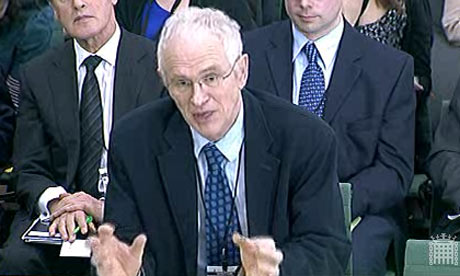Climate scientist admits sending 'awful emails' but denies perverting peer review
In his first public appearance since the beginning of the emails row Phil Jones tells MPs he will be cleared of accusations
Read our live coverage from the hearing
The scientist at the centre of a media storm over global warming research admitted today he had sent "awful emails" but said he expected to be cleared of accusations that he tried to pervert the scientific process.
Phil Jones, head of the Climatic Research Unit at the University of East Anglia, told a parliamentary inquiry that there was nothing in the hundreds of emails released on to the internet last year that supported the claims.

Professor Phil Jones, director of the Climatic Research Unit, gives evidence to the science and technology committee. Photograph: parliamentlive.tv
"I was just commenting that those papers weren't very good," Jones said. "There is nothing that [shows] that me or the CRU were trying to pervert the peer review process in any way."
In his first public appearance since the emails were released in November, Jones faced repeated questions about the way the CRU failed to make publicly available the raw data and computer codes needed to reproduce its work. "It is not standard practice to provide codes and methods," he said. "Perhaps it should be."
He said much of the raw data were available from other sources, such as Nasa, and that there was nothing to stop somebody repeating his calculations and constructing their own temperature records. "There is nothing rocket science in them," he said of his academic publications.
Asked about emails in which Jones refused to share his data with critics, he said: "I've obviously written some really awful emails." But he insisted that the collection of emails made public were "a tenth of one per cent" of his correspondence over the period.
The controversy over the emails, dubbed "climategate" by some, has prompted allegations of scientific misconduct and attempts to keep dissenting findings from scientific journals. It has also raised questions about the validity of the global temperature record used to demonstrate global warming, based on email that scientists used a "trick" to "hide the decline".
Under questions from the committee, prominent climate sceptics Nigel Lawson and Benny Peiser, who represented the Global Warming Policy Foundation, conceded that the use of the word "trick" was innocuous. Lawson said the issue was that the scientists had not disclosed the way they blended several separate data sets into single graph, which he called a "fudge". Jones said this was not true, and the technique was widely discussed in scientific papers.
Lawson and Peiser said they did not think the release of the emails questioned the underlying science of climate change. "This is nothing to do with the basic science, that's not the issue," Lawson said. Peiser said the emails had "tarnished the image of British science around the world".
Jones said some issues raised by the emails, such as an apparent reluctance to comply with Freedom of Information requests, were because the CRU did not have permission to release requested data, which had been supplied by foreign weather services. Several countries, including Sweden, Canada and Poland had refused to allow their information to be supplied, he said.
Former information commissioner Richard Thomas told the committee he could not comment on whether the university had broken the rules, as a recent statement from the information office suggested. But he suggested that there was a stronger case for public disclosure when data had been used to influence public policy, such as in climate science.
Edward Acton, vice-chancellor of the University of East Anglia, told the committee he hoped to announce the chair of a new inquiry, into the scientific findings of the CRU, later this week. The university has already set up a panel to assess the behaviour of Jones and colleagues, which is headed by Sir Muir Russell.
Acton said the university was "longing to publish" the restricted data and had worked with the Met Office to release details. He said he was "puzzled" by the statement from the information office, because no breach of the rules had been established.
In a highly critical written submission to the committee, the Institute of Physics said the emails raised "worrying implications... for the integrity of scientific research in this field and for the credibility of the scientific method".
The institute said: "The emails reveal doubts as to the reliability of some of the [temperature] reconstructions and raise questions as to the way in which they have been represented."
It added: "There is also reason for concern at the intolerance to challenge displayed in the emails. This impedes the process of scientific 'self correction', which is vital to the integrity of the scientific process as a whole, and not just to the research itself."
John Beddington, the government's chief scientiific adviser, told the committee the institute's view was "premature" and that they should wait until the Russell inquiry publishes its findings in the spring.

No comments:
Post a Comment